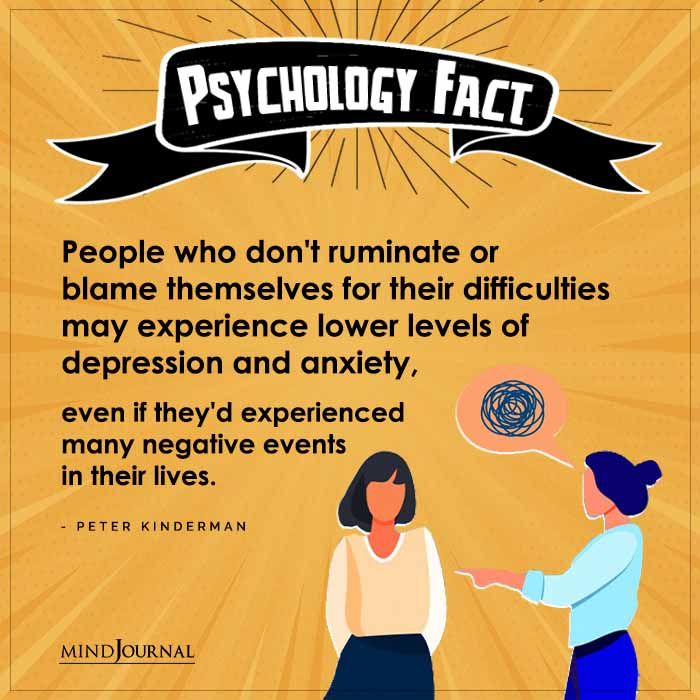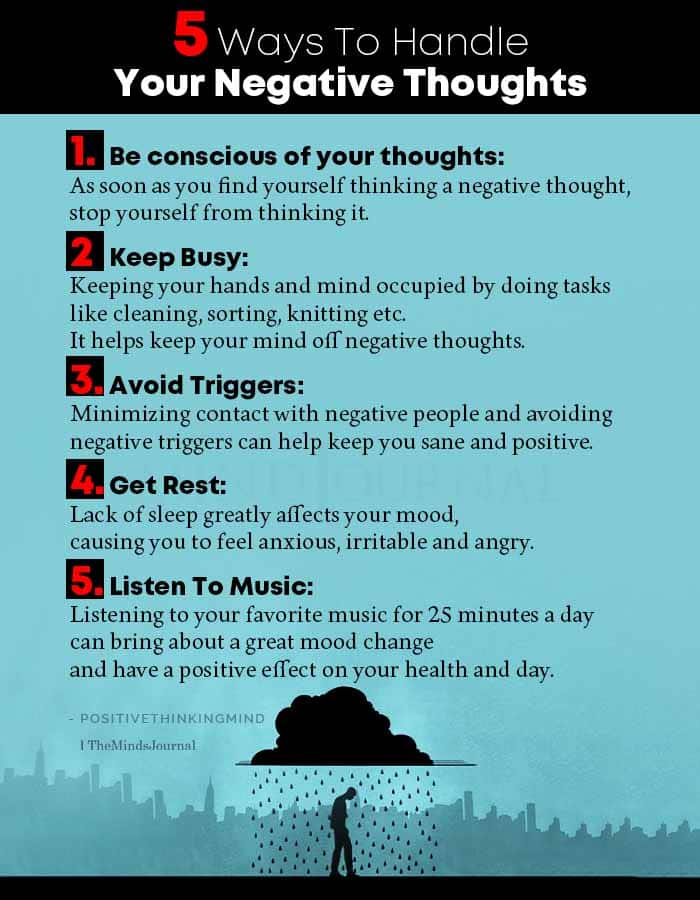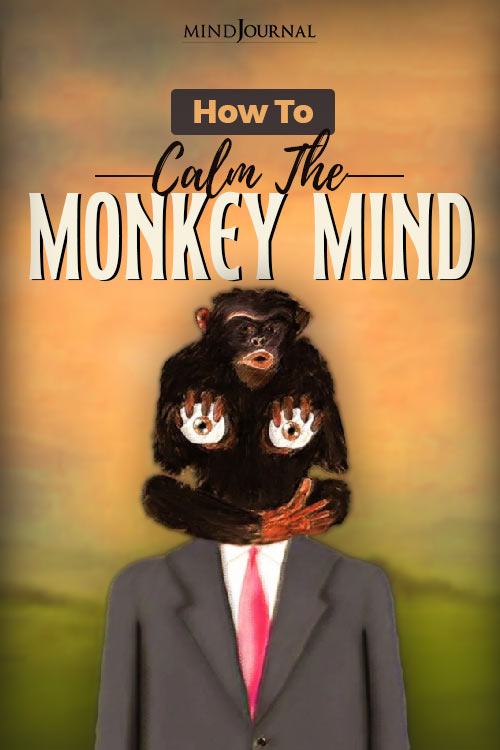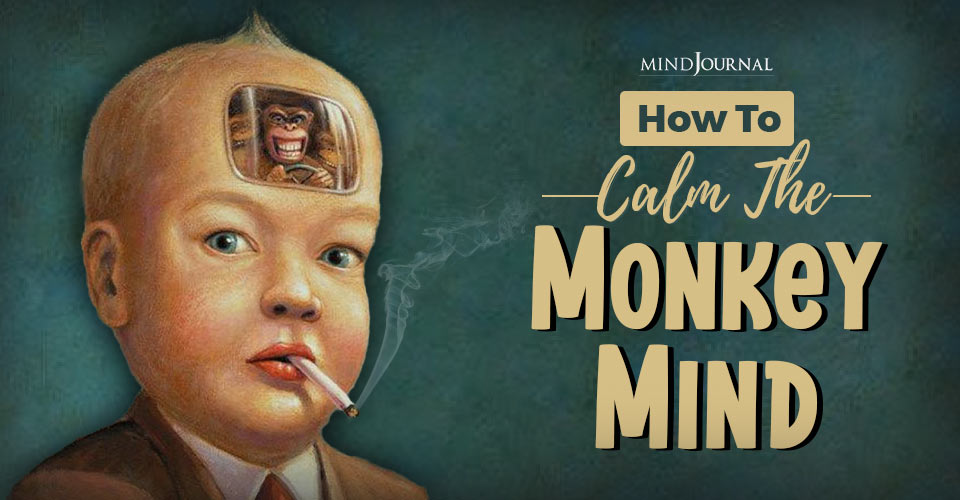Our critical inner voices are all those negative thoughts we have for ourselves and others. These nagging “voices” are the root of self-destructive behaviors. Let’s find out how to calm the monkey mind.
Do you have an inner voice that hinders your success?
According to Buddhist principles, the “monkey mind” is a term that refers to being unsettled, restless, or confused. Writer and Buddhist Natalie Goldberg, who teaches many writing workshops, suggests that the monkey mind is the inner critic.
It’s the part of your brain most connected to the ego, which contends that you can’t do anything right. It’s also the part of you that stifles creativity and prevents you from moving forward with your passions. The monkey mind insists on being heard, and sometimes it takes a lot of self-control to shut it down. It is also the part of your brain that becomes easily distracted, so if you want to get anything done in life, your challenge will be to shut down the monkey mind.

Related: How To Build Your Inner Nurturer: 3 Strategies
The Critical Inner Voice – How to Calm the Monkey Mind
The first step in doing so is to become grounded and calm the mind—that is, remember to be in the here and now. Being present in this way is called mindfulness. It is an essential state for inspiring the best writing because it taps into the messages of your heart and soul. Being mindful encompasses awareness and interconnectedness between your inner and outer worlds. If you are more awake and alert, you can more easily receive messages from within as well as from the universe.

In her book, The True Secret of Writing, Natalie Goldberg reminds us of the importance of mindfulness as we move about our days, whether we’re writing, doing errands, or engaging in interpersonal relationships. Some of the characteristics of mindfulness also include being nonjudgmental, patient, accepting, trusting, and letting go.
Related: 3 Secrets For Silencing Your Inner Critic
When considering how to quiet your mind, try to sit still for a minute and think about what calms you. Contemplate how you can incorporate these activities into your daily life. Even just a few minutes of walking meditation or mindful breathing can bring you into the present moment.
In addition to incorporating mindfulness into your day—even when standing in line at the bank—it’s wise to practice mindfulness before sitting down to write. My day always begins with a meditation, sometimes even before I have my coffee. Sometimes I do a shorter meditation later in the afternoon to give me a boost of energy.
In her Zen writing retreats, Goldberg reminds her students to anchor their minds to their breath by using paper and pen to write. This helps them stay in the moment, as does the mantra: “Sit. Walk. Write.” She calls this the “true secret.”
Even though the mind is a wonderful thing, it can sometimes get in the way of creativity, mainly because the voice in our head can get in the way of what our heart wants to say. Sometimes this voice turns dark and can lead to feelings of fear, guilt, anger, sadness, envy, and resentment, instead of a sense of lightness of being. This voice might seem like a nagging parent or spouse.
The ego has the ability to create false thoughts, which is the inner chatter we hear most often. In fact, it is the voice in our heads that we sometimes tell to “shut up.” Otherwise, we can become overwhelmed by these thoughts or even lose touch with reality. This is one reason why during meditation it’s a good idea to let thoughts come and go, rather than becoming obsessed with them or focusing on anyone in particular. If we focus too intensely on our thoughts, there’s a greater chance that we’ll lose touch with the here and now.
On a recent trip to Maui, I attended a retreat led by Ram Dass, one of the most influential spiritual teachers of the past few decades. Even though he’d had a stroke a few years back, he still continued to relay his very important message of “be here now,” the simplest and best advice for being mindful. His book, Be Here Now (1971), was like a bible for many hippies (like me) in the 1960s.
Those who live in the present moment often come across as being more grounded. As Ram Dass said, “When you meet a being who is centered, you always know it. You always feel a kind of calm, emanation. It always touches you in that place where you feel calm” (1971, p. 46a).
The more we bring our focus into the present moment, the more we experience the bliss and joy of that moment and see what our true essence is. In this way, we can release the demons that come along with the monkey mind. My new book, Writing for Bliss, offers suggestions on how to calm the monkey mind as well.
Writing Prompt
Practice focusing on the here and now. Take a few slow, deep breaths, and focus on your belly. What are you seeing, sensing, hearing, or intuiting at this moment? Ask your body what you’re feeling. Do you feel discomfort anywhere? Does an image pop into your mind? This is body intelligence.
Writing Prompt
Describe the person your mind thinks you are. What do you look like? What do you believe? What is your connection with the universe or your loved ones? Have someone else write about you. Does this person perceive you in the same way you perceive yourself?
Related: 4 Kinds Of Self-Criticism You Must Put An End To
Your inner voice will either fuel your success or prevent you from reaching your goals. Whom will you listen to; your inner critical voice or the one that motivates you?
References Dass, Ram (1971). Be here now. New York, NY: Crown Publishers. Goldberg, N. (2013). The true secret of writing: Connecting life with language. New York, NY: Atria Books Raab, D. (2017). Writing for Bliss: A Seven-Step Plan for Telling Your Story and Transforming Your Life. Ann Arbor, MI: Loving Healing Press. Raab, D. (2017). Writing for Bliss: A Seven-Step Plan for Telling Your Story and Transforming Your Life. Ann Arbor, MI: Loving Healing Press. Raab, D. (2017). Writing for Bliss: A Seven-Step Plan for Telling Your Story and Transforming Your Life. Ann Arbor, MI: Loving Healing Press.
Written by: Diana Raab Ph.D.
Originally appeared on: Psychology Today
Republished with permission











Leave a Reply